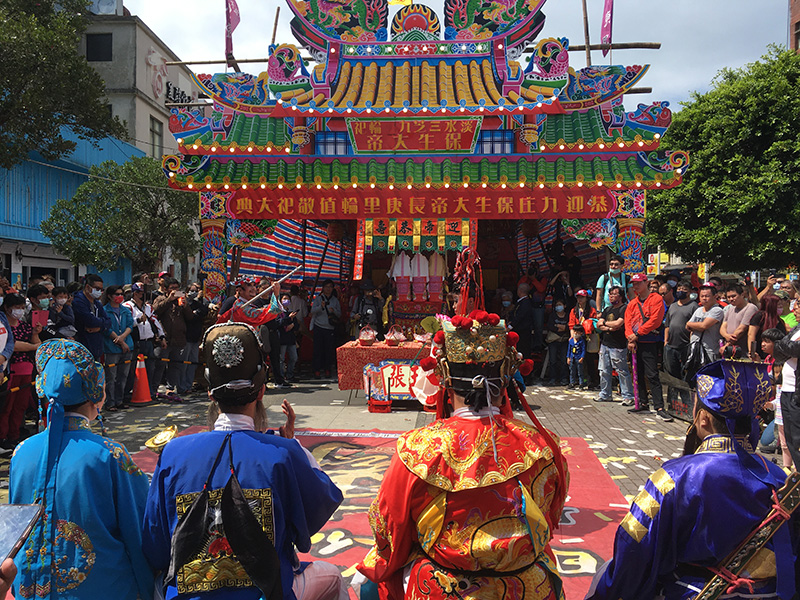This temple fair in Tamsui was held to celebrate Baosheng Dadi.
Baosheng Dadi is a Chinese god of medicine. He is worshiped in Chinese folk religion and Taoism. The god is most popular in Fujian and Taiwan.
Here is an article that describes some of Taiwan’s food offering traditions.
After the pole dancers came the lion dancers with drummers, then the dragon dancers with drummers, then just the drummers by themselves, then the traditional opera performers, another group of lion dancers, a procession of larger than human scale like impersonations of deities and deity guards all accompanied by large groups of musicians, playing drums, cymbals, gongs and suonas.
Right across the bigger tent with the altar was a smaller tent, and at the back of that tent, also filled with food offerings, including four more slaughtered pigs on metal stands with carps and roosters and geese below their open mouths. All the way at the end, where in the bigger tent the altar was positioned, stood a glove puppet stage on a cart. The front of the puppet stage was painted with the fierce creatures in neon colors, the back was loosely covered with some plastic tarp. Nothing was hidden. One could step around and watch the performance of the story from the front or the making of it from the back. One could also find a good side angle and watch them both simultaneously. The puppeteer wore a shirt with a large, photo realistic print of an American Eagle, while the tech-person, who managed the pre-recorded soundtrack and different light effects wore solid light pink. The heads of the glove puppets were a bit bigger than the ones we knew from other forms of traditional BuDaiXi and their make up was garish, the eye shadow and the rouge almost glowed under the neon lights. Yet, despite the puppets wearing elaborate hairstyles, headdresses and costumes, a loud blasting soundtrack and a whole array of light effects, only a few people paid attention to the life performance. Three younger kids walked through the tent stopped and watched for a minute, until they were drawn to something else behind the puppet stage. An old man came by, stopped, smoked half a cigarette and then went on. There was no seating area in front of the stage, nor a dedicated place to stand and watch the show. We had been told that the puppet’s first priority during a temple fair was to perform for the entertainment of the deities and gods who were celebrated on that day. If a few humans joined in watching thee show, good, if they didn’t, no problem. And so it went. The puppets and the puppeteer performed for the deities on the temporary altar all the way across from the puppet stage, while most of the humans kept eating, talking, smoking, cleaning and rearranging the tables and the offerings. When a man started cutting and chopping up the pigs right in front of the puppet stage and a small crowd gathered around to help, comment, pull and drag, even we had to temporarily switch our research focus from “glove puppets as analog hand held entertainment devices” to “how does the skin split open when a chopping knife slices through the skin of a pig.” Once separated from their enormous bodies, the heads, backs, legs and tails of the pigs were carried to a chopping block outside the tent, which was surrounded by people with plastic bags, waiting to get their share, while the priest, now chanting and weaving a small, triangular black flag and a man beating a gong went repeatedly around the tables.
When most of the food offerings were distributed between people, big stacks of gold leafed paper money were unloaded from a small truck. Several groups of people came together to fold, with enormous speed, the individual papers into bent halves. The large plastic baskets were quickly filled and loaded back onto the truck. Most likely the baskets were brought to the temple and the money burnt there.











